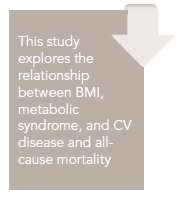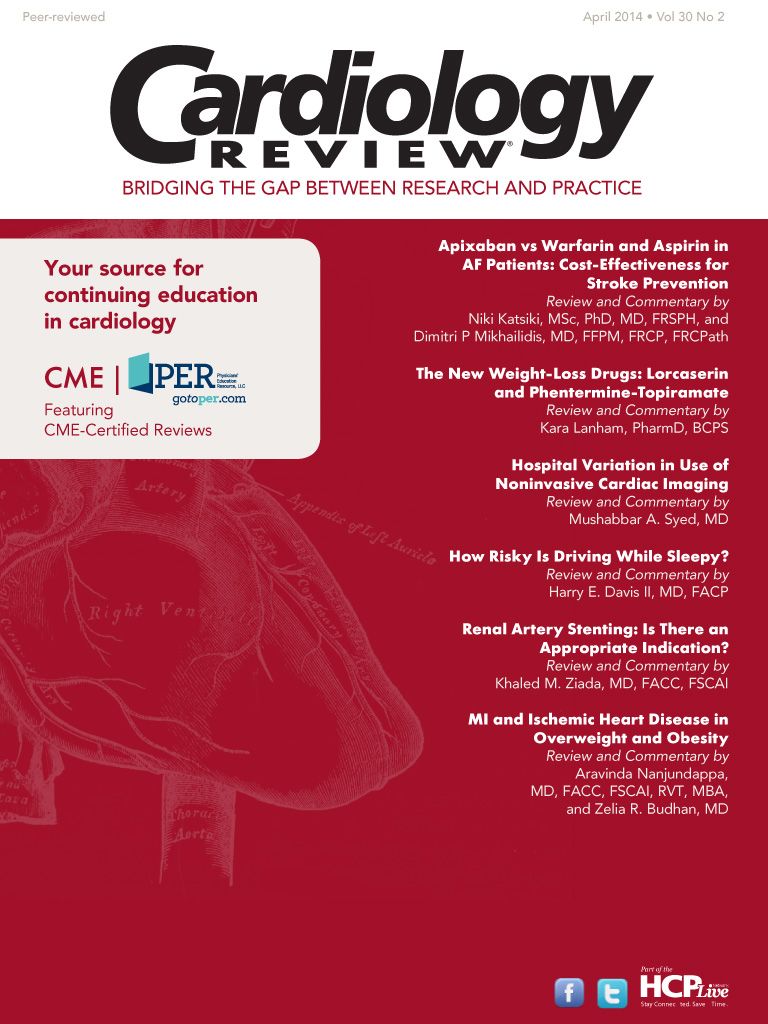MI and Ischemic Heart Disease in Overweight and Obesity
A review of the relationship between body mass index, metabolic syndrome, and cardiovascular disease and all-cause mortality.

Aravinda Nanjundappa, MD, FACC, FSCAI, RVT, MBA, and
Zelia R. Budhan, MD
Review
JAMA Intern Med
Thomsen M, Nordestgaard BG. Myocardial infarction and ischemic heart disease in overweight and obesity with and without metabolic syndrome. . 2014;174(1):15-22.

It has been widely accepted that metabolic syndrome correlates with increased rates of cardiovascular disease and all-cause mortality. This relationship is less clear for body mass index (BMI). Danish researchers Mette Thomsen, MD, and Borge G. Nordestgaard, MD, DMSc, sought to determine whether overweight and obesity independent of the presence or absence of metabolic syndrome correlates with increased incidence of myocardial infarction (MI) and ischemic heart disease (IHD). They conducted a prospective population study of 71,527 whites of Danish descent aged 20 to 100 years from the Copenhagen General Population Study, gathered between 2003 and 2011. They excluded patients with BMI less than 18.5 and individuals with known IHD. BMI was used to divide patients into 3 categories: normal weight, overweight, and obese. The presence of metabolic syndrome, defined based on waist circumference, blood pressure, non-fasting triglycerides, high-density lipoprotein (HDL) cholesterol, and hyperglycemia, was assessed. During a median follow-up of 3.6 years, the investigators recorded hospital admissions and deaths caused by MI and IHD.
There were 634 incidents of MI and 1781 IHD events. The risk of MI or IHD was not based on the presence or absence of metabolic syndrome. Among the BMI categories, overweight and obesity emerged as a major risk factor for MI and IHD.
The results showed that there was a statistically significant increased risk of MI and IHD associated with higher BMI category, independent of the presence or absence of metabolic syndrome. The researchers found evidence based on Mendelian randomization for causality between increased BMI and risk of IHD. The presence of metabolic syndrome only minimally increased the utility of BMI in predicting risk of MI and added no benefit in predicting risk of IHD. The investigators therefore proposed that metabolic syndrome is not more useful than BMI in determining future cardiovascular risk, and they concluded that overweight and obesity, even in the absence of metabolic syndrome, should thus no longer be viewed as benign conditions.
The study authors concluded that elevated BMI (overweight and obesity) is a risk factor for MI and IHD irrespective of absence or presence of metabolic syndrome.
CommentaryElevated BMI Really Does Matter
Evidence of increased risk for MI and IHD in obese and overweight patients, whether or not metabolic syndrome is present, is an important finding. Obesity and overweight are an increasingly common problem worldwide. In 2008 more than one-third of the global population was estimated to be obese or overweight.1 Among the general population, obesity and/ or overweight seems to be associated with elevated risk of developing cardiovascular disease, cardiovascular death, and even allcause mortality.2 Despite such an association, several studies have demonstrated an inverse relationship between mortality and obesity or overweight in selected patients with coronary artery disease.3 This inverse relation seems to exist in patients with previous cardiovascular events. The inverse relation has demonstrated a survival benefit for obese or overweight patients and hence the term “obesity paradox” has been applied to this phenomenon.
Despite the paradox, obesity and overweight are important epidemics that continue to plague patients worldwide. Metabolic syndrome alone is a well-established risk factor for both MI4 and IHD. However, patients with elevated BMI may or may not have metabolic syndrome. The study addresses the outcomes of MI and IHD in this subset of patients with elevated BMI with and without metabolic syndrome.
Compared with previous studies using an approach similar to that of Thomsen and Nordestgaard, the present trial is believed to have the largest sample size to date and included men and women. The median follow- up time of 3.6 years is also an adequate time period to determine cardiovascular events. However, some of the unique findings in this study could have confounded the results.
- BMI was high within each category in patients with metabolic syndrome. This could have contributed to excess risk observed in patients with metabolic syndrome.
- The study used a modified definition of metabolic syndrome such as nonfasting plasma glucose levels and triglyceride levels.
- Variation within each BMI category and some of the components of metabolic syndrome could influence the results.
- Only the white Danish population was studied, so the findings may not apply to the rest of the world.
- There was a possible selection bias of healthier overweight, obese patients due to selection of patients from general population.
- The dose and type of lipid-lowering drugs was not known; thus, the potential effect of lipid-lowering drugs in terms of reduction of cardiovascular events may be underestimated.
- The results for IHD were not as robust as MI. This may be due to the diagnostic criteria used for IHD in the study. The use of symptoms of angina pectoris could have led to misclassification. Women can have dyspnea on exertion as the first symptom and should be considered as angina equivalent.
Nevertheless, the study demonstrates a very important fact: elevated BMI is an independent risk factor for MI and IHD. The study demonstrates the fact that overweight and obesity are not benign conditions. Despite previous findings about the obesity paradox, elevated BMI should be vigorously addressed by physicians. Metabolic syndrome’s importance as a marker of cardiovascular events cannot be sidelined based on this study alone.
A large-scale, population-based epidemiological study is warranted based on the findings of Thomsen and Nordestgaard’s study. The new study should be prospective and multinational, and include diverse, multiracial patient subgroups. The study should utilize a standard definition of metabolic syndrome. The role of high-dose powerful lipid-lowering drugs such as rosuvastatin should be evaluated. It will be of great importance to replicate the study by Thomsen et al for a worldwide population. The study must incorporate aggressive approaches to address metabolic syndrome and elevated BMI. The follow-up data should include outcomes after the treatment of risk factors and elevated BMI.
Elevated BMI should be documented at outpatient clinics and in all inpatients. Obesity and overweight should be addressed in all patient populations similar to risk factors such as hypertension, diabetes mellitus, smoking, and hypercholesterolemia. Advice should include measures to ensure and maintain weight loss. Interventions should include counseling, dietary modification, education, advice on exercise, medications to assist weight loss, and bariatric surgery if needed. Maintaining a low body weight is pivotal to reducing cardiovascular events.
References
1. World Health Organization. Obesity and overweight. www.who.int/dietphysicalactivity/media/ en/gsfs_obesity.pdf. Published 2003.
2. Yusuf S, Hawken S, Ôunpuu S, et al. Obesity and the risk of myocardial infarction in 27,000 participants from 52 countries: a case-control study. Lancet. 2005;366:1640-1649.
3. Romero-Corral A, Montori VM, Somers VK, et al. Association of body weight with total mortality and with cardiovascular events in coronary artery disease: a systematic review of cohort studies. Lancet. 2006;368:666-678.
4. Mente AI, Yusuf S, Islam S; INTERHEART Investigators. Metabolic syndrome and risk of acute myocardial infarction: a case-control study of 26,903 subjects from 52 countries. J Am Coll Cardiol. 2010;55:2390-2398.
About the Author
A
ravinda
N
anjundappa
, MD, FACC, FSCAI, RVT, MBA,
Z
elia
R. B
udhan
, MD,
is Professor of Surgery and Medicine at the Robert C. Byrd Health Science Center, West Virginia University, Charleston Division, Charleston, WV. He was assisted in the writing of this article by a resident at Charleston Area Medical Center Health Center in Charleston, WV.
